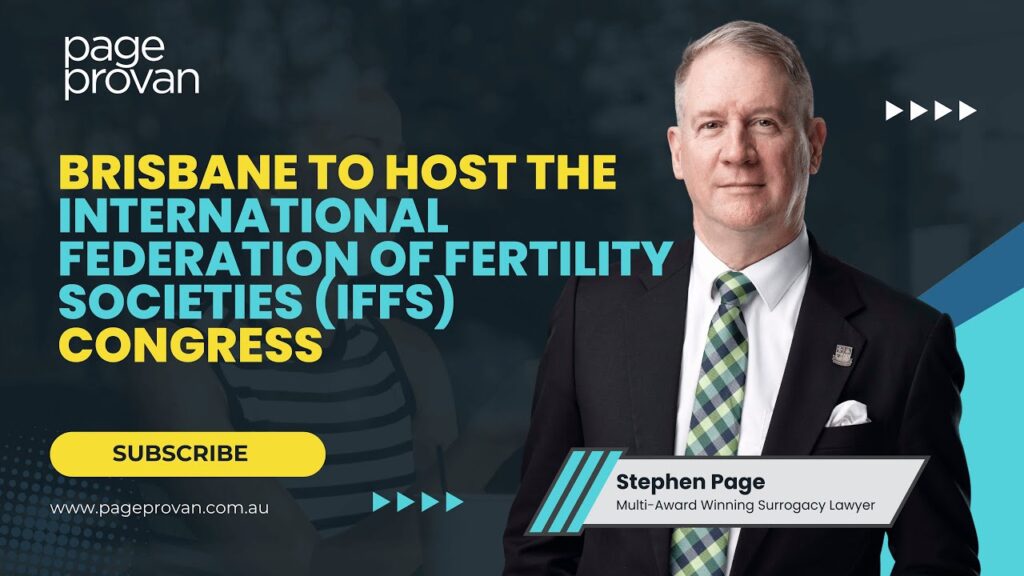Back in June, I wrote in my
supplementary submissions to
my main submissions to the Family Law Council about a recent case in the Family Court.
Recently I was asked by Rodney Cruise, convenor of Gay Dads Australia, to write about the case again.
The case is called Groth and Banks. Justice Cronin said that the sperm donor was the legal father of the child when the recipient was the genetic single mother.
The case emphasises three things:
- The rules regarding who is or is not a parent are remarkably arcane, and seem to be changing. Those who thought the sperm donor was not a parent but now may be a parent- whether they like it or not.
- Honesty between the couple was essential- but lacking in several respects.
- Stated intention was trumped by genetics.
The facts
Mr Groth and Ms Banks had been in a relationship. They split up.
Sometime after they split up, Ms Banks asked Mr Groth to supply sperm so that she could become a mother. Mr Groth agreed. They went to an IVF clinic in Melbourne. They told the clinic they were a couple. They weren’t. Mr Banks signed a consent form to say that he did not intend to be a parent, but was a donor. The form was provided by the clinic in accordance with Victorian law.
After his partner saw some messages and then questioned Mr Groth did it tumble out as to what he had done. He then asked the Family Court to find that he was a father.
The decision
Justice Cronin determined as a matter of statutory drafting that the Family Law Act envisages that there are two biological parents of a child and that unless there is a displacement under the Family Law Act a sperm donor can be a parent. His Honour determined that a known sperm donor to a single woman was a parent; section 60H of the Family Law Act not applying.
His Honour was of the view that the provisions of the Family Law Act overrode the relevant Victorian legislation that declared that the sperm donor was not a parent. Therefore his Honour did not consider the consent form signed by the sperm donor in which he acknowledged that he was only a donor and not a parent.
This decision has sent a shockwave through IVF clinics as it clearly states that known donors in certain circumstances are no longer donors but are parents and that as a result may have rights and responsibilities under the Family Law Act, have a liability to pay child support and their child may have a right of inheritance.
His Honour stated:
“In Re Mark: An Application Relating to Parental Responsibilities [2003] FamCA 822; (2003) 179 FLR 248; (2003) 31 Fam LR 162; (2003) FLC 93-173, Brown J considered the differing positions of a sperm donor who was unknown or anonymous, and a donor who had entered the process with the intention of fathering a particular child. Her Honour held that a person in the latter position was rightly considered a “parent” for the purposes of the Act. If this were not the case, there would be no need for legislation such as the Status of Children Act 1974 (Vic) to remove the rights and responsibilities that might otherwise attach to anonymous or unknown donors.
Brown J reproduced the Oxford English Dictionary definition of a parent, being “a person who has begotten or borne a child”, which was also relied upon in Tobin. In Re Mark, the man had donated his genetic material with the express intention of fathering a child he would parent. Moreover, her Honour found at [59],
[t]he fact the ovum was fertilised by a medical procedure, as opposed to fertilisation in utero through sexual intercourse, is irrelevant to either his parental role or the genetic make-up of [the child].
The applicant here submits that the same course should be taken in this case. His argument is that the course of conduct leading to the conception of the child is clearly distinguishable from a donor who does not wish to have an involvement in the child’s life. Concerns of public policy, such as those raised by Guest J in Re: Patrick (An Application Concerning Contact) [2002] FamCA 193 at [298] that unknown sperm donors could be considered “parents” under such an interpretation become irrelevant because the Act does not impose obligations on an unknown person who has donated biological material.
Thus, the interpretation of “parent” in the Act allows each case to be determined on its particular facts.
The fact that a child has two parents who are her or his biological progenitors permeates the language of the Act. The whole Commonwealth statutory concept as outlined in the Part VII of the Act is one in which biology is the determining factor unless specifically excluded by law. I return to those exclusions below.
Part VII of the Act contains multiple references to the parents of the child as “either” or “both”. These can be found at s 60B(1)(a), 60B(2)(a) and (b), 60CC(2)(a), 60CC(3)(d)(i),
61C(2), 65C(a), 66B(2), 66F(1) and 69C(2). The logical presumption which follows is that the legislature envisaged two parents when dealing with parental responsibility under the Act.
The applicant fits that presumption in the Act of who is a parent. He is the biological progenitor and one of two people who set about a course of conduct with the intention of fathering a child. On the face of the language in the Act and the facts here, a logical conclusion would be that the applicant is the parent of the child. If one turns to the sections of the Act that displace biological progenitors as parents, little changes.”
There are three ways of saying who is a parent:
· By genetics;
· By birth; or
· By intention.
The approach taken by his Honour was by genetics. The basis on which Mr Groth was determined to be a parent relied on genetics. Nevertheless his Honour distinguished between known and anonymous donors. It is my view that if a genetics based approach were to be taken then the intention of the donor is irrelevant. Following the analysis to conclusion, anonymous donors to single women would be considered to be parents because each man is the “biological progenitor” of the child.
What is clear to me is that there may be many known sperm donors to single women who are now parents of those children, including being liable to pay child support, whether or not they intended that, and whether or not they or the mothers want them to be .












